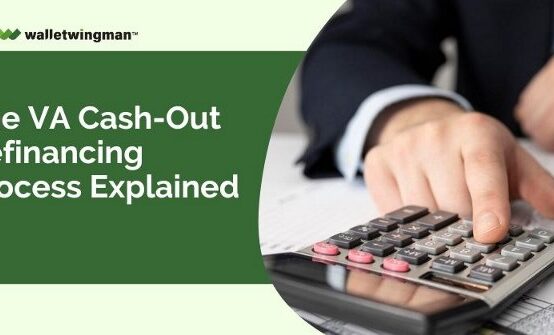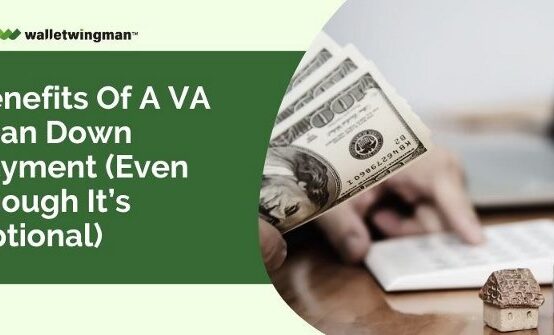The Department of Veterans Affairs does not require a minimum credit score for the VA home loan program. However, having a good score could help you qualify for a mortgage loan and secure a lower interest rate.
This guide explains what credit scores are, how they can affect the VA loan mortgage rates on a VA loan, and how you can increase your score if it happens to be low.
Understanding VA Loans

Designed to help veterans, active-duty service members, and qualified surviving spouses, the VA loan program was first introduced in 1944 as a component of the GI Bill.
VA loans include advantages including low interest rates, lower VA funding fee, no VA loan mortgage insurance, and no down payment. Furthermore, lenders usually have restrictions, but the VA does not impose minimum credit score criteria. It is imperative that veterans comprehend the benefits of these loans as well as the VA loan property requirements for qualifying.
Additionally, interest rates are heavily influenced by credit scores, which links the significance of good credit to the larger picture of VA loan advantages.
What Is a Credit Score, Exactly?

A credit score is a three-digit number banks and lenders use to assess your “creditworthiness,” or how likely you are to fulfill VA loan requirements on time. It’s like a report card for your borrowing behavior. The higher your score, the more attractive you are as a borrower, which can translate into a lower mortgage rate.
Credit reports provide details about your payment patterns, debt amounts, credit history duration, credit kinds utilized, and recent credit queries. All of these factors go into determining your credit score.
If you’ve taken out loans or credit cards in the past, you probably have three different credit scores. That’s because three credit-reporting agencies in the US compile this kind of information—Equifax, Experian, and TransUnion.
As a risk indicator, mortgage lenders look at credit scores. Lenders want to ensure that they’re making loans to borrowers with a high likelihood of repaying. They use a variety of information to determine this, and that includes the borrower’s credit score.
There are different credit-scoring models available these days. Mortgage lenders often use the FICO scoring model, which ranges from 300 to 850.
How It Affects the Mortgage Rate on a VA Loan

When you hear about “mortgage rates” in the news, they’re usually talking about the nationwide average rates reported by Freddie Mac. However, on an individual basis, mortgage rates can vary from one borrower to the next, and sometimes significantly.
Mortgage rates are not the product of one factor alone. Banks and lenders use several variables to determine the interest rate they assign to VA loans during VA mortgage process.
Here are some of those influencing factors:
- Credit Score: A higher credit score often leads to lower mortgage rates.
- Down Payment: Larger down payments may result in lower rates.
- Loan Term: Shorter loan terms typically have lower rates than longer ones.
- Type of Loan: Fixed-rate loans may have different rates than adjustable loans.
- Discount Points: Paying points upfront can lower the interest rate.
How Credit Scores Affect VA Loan Rates

There is no required minimum credit score set by the VA itself, but lenders that offer loans do have some requirements. These VA home loan requirements can differ, yet the majority of lenders demand that customers have a credit score of 620 and above.
Nevertheless, individuals who score lower can still secure a VA loan, though at a slightly higher interest rate.
To make it more clear below are the factors that can influence the VA loan rates.
Interest Rate Tiers: Some financiers apply differential VA loan rates where the rates vary depending on the client’s credit rating. For instance, people in the FICO score range of 720 and above can access the best interest rates, while those in the range of 620 to 719 will pay a slightly premium amount. Applicants with credit scores below 620 might end up with even higher rates or get some extra VA loan inspection requirements during their loan approval.
Risk-Based Pricing: Lenders employ risk-based pricing when determining the interest rates on the loans. Borrowers with better credit scores are considered less risky because they are less likely to default on their loans, so they qualify for lower interest rates. On the other hand, low ratings mean high risk, attracting higher premiums to cover the increased chances of non-repayment.
Impact of Score Variations: It is important to note that minor changes in credit scores can lead to large fluctuations in mortgage rates. For example, the booster from 650 credit score to 700 could significantly decrease the interest rate and, over the loan term, save thousands of dollars.
If you plan to apply for a VA loan shortly, you should check your credit scores to see where you stand.
If you discover you have a score in the 750 range or higher, you’re already in good shape. A score in that range could help you qualify for a VA loan with a highly competitive mortgage rate.
On the other hand, if your score is in the low-600 range or lower, you might benefit from boosting it before you apply for a loan. So, let’s talk about how to do that.
How to Increase Your Credit Score
Despite what some websites might tell you, there is no “secret formula” for increasing a credit score. All you have to do is address the factors that positively influence your score.
The business that developed the FICO credit-scoring methodology lists these five determining elements.:
- Payment History (35%): This is one of the most critical factors and shows how reliably you’ve made payments on your credit accounts in the past.
- Amounts Owed (30%): This includes your total debt and credit utilization ratio (i.e., the amount of credit used compared to the limit).
- Length of Credit History (15%): A more extended history with on-time payments can positively impact your score.
- New Credit (10%): Your credit score may suffer if you apply for too much new credit quickly.
- Credit Mix (10%): Having a variety of credit histories, such as installment loans (e.g., car loans) and revolving credit (e.g., credit cards), can be beneficial.
Since credit scores have such a significant influence on mortgage rates, veterans need to be concerned with fixing their credit. Below are some strategies to boost credit scores:
Timely Bill Payments: Paying bills is an essential aspect of living, and it has to be done regularly. It is advisable to make automatic payments or appointment reminders to prevent delayed payments since they are likely to impact credit scores negatively.
Reduce Debt: Pay-down of debt reduces credit utilization ratios in the following ways. An individual should ensure that credit card balances are at most 30% of the credit limit.
Avoid Opening New Accounts: It’s also important to know that your score may drop a point or two whenever you apply for credit. It is also important to avoid opening new credit accounts whenever possible.
Check Credit Reports: Check your credit details from the three credit bureaus, Equifax, Experian, and TransUnion, for any mistakes. Dispute any errors promptly.
Credit Counseling: If you are experiencing difficulties managing your credit, you should consider engaging credit counseling agencies. There are agencies that can offer specific consultations and also develop a strategy to work on credit.
Patience and Consistency: It is significant to understand that developing and sustaining a good credit score is not a one-day affair. The result of maintaining a good credit standing and being creditworthy is reaped in the long run.
As you can see, your payment history “weighs” more than any other factor. It can also affect your capability to qualify for a VA loan for second home with a reasonable mortgage rate. That’s why paying your bills on time and in full is so important.
“Amounts owed” refers to the total amount of money you owe across all your credit cards and active loans. It’s not wrong to owe money. Making timely payment payments on your debts is how you establish a positive credit history in the first place.
However, owing too much money relative to your available limits can hurt your credit score. So, if you’re currently “maxed out” on your credit cards (or approaching that limit), it’s probably harming your score.
Here’s what you should take away from all of this:
You can create a good credit score by making all your payments on time and limiting your credit usage. A higher score could help you secure a lower mortgage on a VA loan rate, which could reduce your monthly payments and total housing costs.


 How to Buy a Condo Unit with a VA Mortgage Loan
How to Buy a Condo Unit with a VA Mortgage Loan  How Much Can I Borrow When Using a VA Loan to Buy a House?
How Much Can I Borrow When Using a VA Loan to Buy a House?  The VA Cash-Out Refinancing Process Explained
The VA Cash-Out Refinancing Process Explained  10 Important Quotes from the Official VA Loan Buyer’s Guide
10 Important Quotes from the Official VA Loan Buyer’s Guide  VA Loan Preparation Guide: 7 Things to Do Before You Apply
VA Loan Preparation Guide: 7 Things to Do Before You Apply  Benefits of Making a VA Loan Down Payment (Even When It’s Optional)
Benefits of Making a VA Loan Down Payment (Even When It’s Optional) 